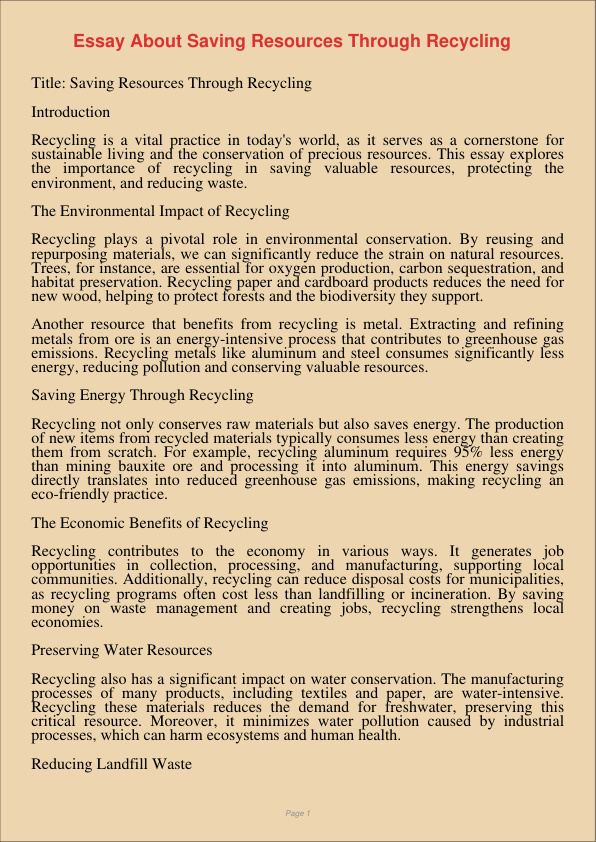Essay About Saving Resources Through Recycling
Jan 9, 2024
saving resources
recycling
Finance & Accounting
Nursing

Title: Saving Resources Through Recycling
Introduction
Recycling is a vital practice in today’s world, as it serves as a cornerstone for sustainable living and the conservation of precious resources. This essay explores the importance of recycling in saving valuable resources, protecting the environment, and reducing waste.
The Environmental Impact of Recycling
Recycling plays a pivotal role in environmental conservation. By reusing and repurposing materials, we can significantly reduce the strain on natural resources. Trees, for instance, are essential for oxygen production, carbon sequestration, and habitat preservation. Recycling paper and cardboard products reduces the need for new wood, helping to protect forests and the biodiversity they support.
Another resource that benefits from recycling is metal. Extracting and refining metals from ore is an energy-intensive process that contributes to greenhouse gas emissions. Recycling metals like aluminum and steel consumes significantly less energy, reducing pollution and conserving valuable resources.
Saving Energy Through Recycling
Recycling not only conserves raw materials but also saves energy. The production of new items from recycled materials typically consumes less energy than creating them from scratch. For example, recycling aluminum requires 95% less energy than mining bauxite ore and processing it into aluminum. This energy savings directly translates into reduced greenhouse gas emissions, making recycling an eco-friendly practice.
The Economic Benefits of Recycling
Recycling contributes to the economy in various ways. It generates job opportunities in collection, processing, and manufacturing, supporting local communities. Additionally, recycling can reduce disposal costs for municipalities, as recycling programs often cost less than landfilling or incineration. By saving money on waste management and creating jobs, recycling strengthens local economies.
Preserving Water Resources
Recycling also has a significant impact on water conservation. The manufacturing processes of many products, including textiles and paper, are water-intensive. Recycling these materials reduces the demand for freshwater, preserving this critical resource. Moreover, it minimizes water pollution caused by industrial processes, which can harm ecosystems and human health.
Reducing Landfill Waste
One of the most pressing issues in waste management is the growth of landfills. Landfills release harmful greenhouse gases, and they often occupy vast areas of land that could be used for other purposes. Recycling diverts materials from landfills, reducing the strain on these waste disposal sites and lowering the associated environmental and health risks.
Promoting Sustainability
Recycling is a tangible way for individuals, businesses, and governments to contribute to sustainability. It encourages responsible consumption and waste reduction by promoting the idea that resources are finite and should be used wisely. By recycling, we can instill a culture of sustainability that respects the planet’s natural limits.
Conclusion
Recycling is not merely an environmental slogan but a practical solution for saving resources, conserving energy, reducing pollution, and promoting economic growth. It is an integral part of sustainable living and a necessary step toward a healthier, more prosperous future. By recognizing the importance of recycling and actively participating in recycling programs, we can collectively make a significant difference in the conservation of our planet’s resources and the protection of the environment.